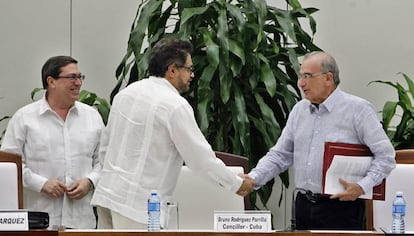Colombia’s paramilitaries raise the specter of a return to violence
Spate of killings threatens efforts to conclude a revised peace deal with FARC guerrillas
Fears that Colombia could descend into the violence of the recent past have been stoked by a spate of killings in recent days of human-rights and environmental activists following agreement over a revised peace deal between the government of President Juan Manuel Santos and the leftist guerrillas of the Revolutionary Armed Forces of Colombia (FARC).

At least three people were killed over the weekend and another two seriously wounded in attacks attributed to right-wing paramilitary groups. A note left by the so-called United Self-Defense Forces of Colombia (AUC) and a rifle at the scene of one of this weekend’s murders in Caquetá, a department in the south of the country close to the border with Ecuador and Peru, contained a warning for FARC supporters.
Labeled a terrorist organization by the European Union and the United States, the AUC was set up in 1997 and attracted some 30,000 fighters, before it was officially disbanded in 2006. It was made up of vigilante anti-guerrilla groups and defectors of drug kingpin Pablo Escobar’s Medellin cartel, leaving a trail of death and terror in the wake of its drug-trafficking activities.
Santos has made it clear that the revised peace deal will not be put to a popular vote
A recent report by Colombian daily El Espectador said that so far this year some 70 human rights and environmental activists, as well as community leaders, have been murdered, with almost 300 others receiving death threats.
Last week, the Colombian government published a revised peace deal with the FARC in a bid to build support to end a 52-year war, after the original draft was rejected last month in a referendum amid objections it was too favorable to the rebels.
Santos, who won the Nobel Peace Prize last month for his efforts to end the war, said he would first consult with the FARC leadership, but said he agreed with the revised agreement being discussed by lawmakers.
In the late 1980s, more than 4,000 members of the left-wing Patriotic Union were murdered by paramilitaries. The FARC has called on President Santos to act against the latest spate of killings. “This situation is dramatic and very worrying. A new genocide is underway against community leaders and peasants,” says a recent statement by the FARC.
So far this year some 70 community leaders have been murdered
The murder of community leaders and activists, along with the death of two guerrillas last week at the hands of the armed forces, has highlighted the urgent need to sign a new peace deal in the wake of the rejection of the previous accords rejected in a referendum on October 2.
Over the weekend, as news of the latest killings spread, Humberto de la Calle, the Colombian government’s chief negotiator, along with the country’s high commissioner for peace, Sergio Jaramillo, both called for the peace process to be concluded as soon as possible, pointing out the danger of the FARC responding to the paramilitaries’ provocations.
FARC representatives and the government have been holding new talks since October 2 in a bid to incorporate demands from opponents of the peace deal. Santos has made it clear that the revised agreement, which is expected to be signed this week, will not be put to a popular vote, but will be approved by Congress. A demobilization process would then see the FARC hand over its weapons within a period of 180 days.
Former President Álvaro Uribe has led a campaign against the peace deals, and has already said that he does not believe the changes made to the accords since the referendum meet the demands of opponents. Uribe is backed by another former president, Andrés Pastrana, who has called on Santos to put the new peace deal to a another public vote, accusing him of trying to railroad any new accord with the FARC through Congress.
English version by Nick Lyne.
Tu suscripción se está usando en otro dispositivo
¿Quieres añadir otro usuario a tu suscripción?
Si continúas leyendo en este dispositivo, no se podrá leer en el otro.
FlechaTu suscripción se está usando en otro dispositivo y solo puedes acceder a EL PAÍS desde un dispositivo a la vez.
Si quieres compartir tu cuenta, cambia tu suscripción a la modalidad Premium, así podrás añadir otro usuario. Cada uno accederá con su propia cuenta de email, lo que os permitirá personalizar vuestra experiencia en EL PAÍS.
¿Tienes una suscripción de empresa? Accede aquí para contratar más cuentas.
En el caso de no saber quién está usando tu cuenta, te recomendamos cambiar tu contraseña aquí.
Si decides continuar compartiendo tu cuenta, este mensaje se mostrará en tu dispositivo y en el de la otra persona que está usando tu cuenta de forma indefinida, afectando a tu experiencia de lectura. Puedes consultar aquí los términos y condiciones de la suscripción digital.









































